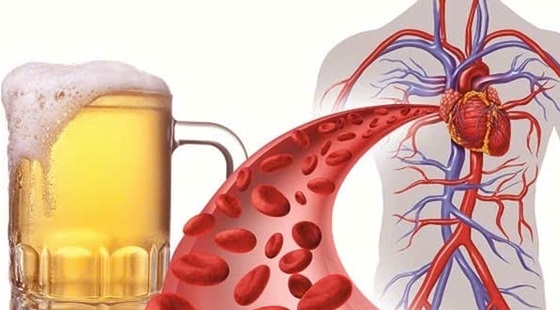Alcohol Consumption and Its Impact on Blood Vessels and Arterial Health in Adults with Persistent COVID-19
Nikhil Prasad Fact checked by:Thailand Medical News Team Feb 17, 2025 1 month, 3 weeks, 3 days, 12 hours, 37 minutes ago
Medical News: A recent study has uncovered significant insights into the impact of alcohol consumption on vascular health and arterial stiffness in adults suffering from persistent COVID. Researchers from the Primary Care Research Unit of Salamanca (APISAL)-Spain, the Institute of Biomedical Research of Salamanca (IBSAL)-Spain, the University of Salamanca-Spain, the Research Network on Chronicity, Primary Care and Health Promotion (RICAPPS)-Spain, and the University Hospital of La Paz in Spain conducted this study to better understand the link between alcohol intake and vascular changes in this group of patients.
 Alcohol Consumption and Its Impact on Blood Vessels and Arterial Health in Adults with Persistent COVID-19
Alcohol Consumption and Its Impact on Blood Vessels and Arterial Health in Adults with Persistent COVID-19
Persistent COVID, also known as long COVID, has been recognized as a condition where individuals continue to experience symptoms months after the initial infection. The cardiovascular implications of long COVID remain an area of concern, and researchers sought to explore how alcohol consumption might further influence vascular health in these patients. This
Medical News report highlights the key findings of this investigation and their implications for long-term cardiovascular risk.
How the Study Was Conducted
The study involved 305 participants (97 men and 208 women) diagnosed with persistent COVID based on World Health Organization (WHO) criteria. Researchers measured arterial stiffness using various indicators, including the cardio-ankle vascular index (CAVI), brachial-ankle pulse wave velocity (ba-PWV), and carotid-femoral pulse wave velocity (cf-PWV). Additionally, vascular structure was assessed through carotid intima-media thickness (c-IMT), which serves as an early marker of atherosclerosis.
Participants were categorized based on their alcohol consumption levels: non-drinkers, low-to-moderate drinkers, and heavy drinkers. Alcohol intake was recorded using standardized questionnaires and measured in grams per week. The findings were then analyzed to assess correlations between alcohol use and vascular health.
Key Findings of the Study
Heavy Drinkers Showed Worse Vascular Health
-Heavy alcohol consumers exhibited significantly higher levels of c-IMT, cf-PWV, ba-PWV, and CAVI compared to non-drinkers (p < 0.05), indicating increased arterial stiffness and potential damage to blood vessels.
-The analysis revealed a positive association between heavy alcohol intake and c-IMT (β = 1.08, 95% CI 1.01–1.17) and cf-PWV (β = 1.37, 95% CI 1.04–1.80), suggesting that excessive alcohol consumption might accelerate vascular aging.
Low-to-Moderate Drinkers Had Better Vascular Parameters Than Non-Drinkers
-Surprisingly, individuals who consumed alcohol in low-to-moderate amounts showed lower arterial stiffness levels compared to both non-drinkers and heavy drinkers. The ba-PWV levels were notably lower in this group (p = 0.002).
-This observation supports previous research suggesting a potential protective effect of moderate alcohol consumption on arterial function, possibly due to its influence on HDL cholesterol levels and anti-inflammatory properties.
Beverage Type and Vascular Impact
-The study also examined whether different types of alcoholic beverages had varying effects on vascular health.
-Wine and beer drinkers demonstrated higher c-IMT and CAVI levels compared to non-drinkers (p < 0.05), indicating a potential link between certain alcohol types and vascular changes.
-However, the small sample size of participants consuming high-alcohol-content beverages made it difficult to draw definitive conclusions for this group.
What These Findings Mean for Public Health
The results of this study raise important concerns regarding alcohol consumption and its potential role in worsening vascular health among patients with persistent COVID. The association between heavy drinking and increased arterial stiffness suggests that excessive alcohol intake could contribute to long-term cardiovascular risks, particularly in individuals already affected by long COVID.
On the other hand, the observation that low-to-moderate drinking may be associated with lower arterial stiffness compared to non-drinking presents an interesting perspective. While this could indicate some protective effects, it remains critical to interpret these findings with caution. Previous research has debated whether moderate alcohol consumption is beneficial, and other health risks associated with drinking, such as liver disease and cancer, must also be considered.
The Need for Further Research
While this study provides valuable insights, it has certain limitations. Being a cross-sectional study, it does not establish a direct cause-and-effect relationship.
Additionally, the reliance on self-reported alcohol consumption may introduce some inaccuracies. More extensive longitudinal studies are needed to confirm these findings and determine whether alcohol consumption plays a definitive role in vascular aging in patients with persistent COVID.
Researchers also highlight the importance of considering other lifestyle factors, such as diet and physical activity, when assessing cardiovascular risk. Future studies could explore these aspects to provide a more comprehensive understanding of how various habits interact with vascular health.
Conclusion
The study suggests that heavy alcohol consumption is linked to increased arterial stiffness and vascular structure alterations in individuals with persistent COVID. This finding underscores the potential dangers of excessive drinking, particularly for those already facing health challenges due to long COVID. Meanwhile, low-to-moderate alcohol consumption appeared to be associated with lower arterial stiffness compared to both non-drinkers and heavy drinkers, though further research is needed to confirm this potential protective effect.
Given the cardiovascular risks associated with persistent COVID, individuals should be mindful of their alcohol consumption and consider lifestyle changes to support heart and vascular health. Healthcare providers should also educate long COVID patients on the potential impact of alcohol on their vascular system and encourage healthier choices.
The study findings were published in the peer-reviewed journal: Nutrients.
https://www.mdpi.com/2072-6643/17/4/703
For the latest COVID-19 News, keep on logging to Thailand
Medical News.
Read Also:
https://www.thailandmedical.news/news/cerebromicrovascular-health-and-long-covid
https://www.thailandmedical.news/news/american-study-finds-that-creatine-monohydrate-helps-improve-vascular-health-of-older-adults
https://www.thailandmedical.news/news/covid-19-impairs-artery-flow-mediated-dilation-increases-systolic-blood-pressure-and-arterial-stiffness-in-young-adults
https://www.thailandmedical.news/news/16-percent-of-individuals-with-arterial-stiffness-will-develop-glaucoma
https://www.thailandmedical.news/pages/thailand_doctors_listings
Follow us on:
https://x.com/ThailandMedicaX
https://www.facebook.com/ThailandMedicalNews
https://bsky.app/profile/thailandmedical.bsky.social
https://gettr.com/user/thailandmedicalnews
https://www.tribel.com/thailandmedical/wall
and 33 other social media platforms
